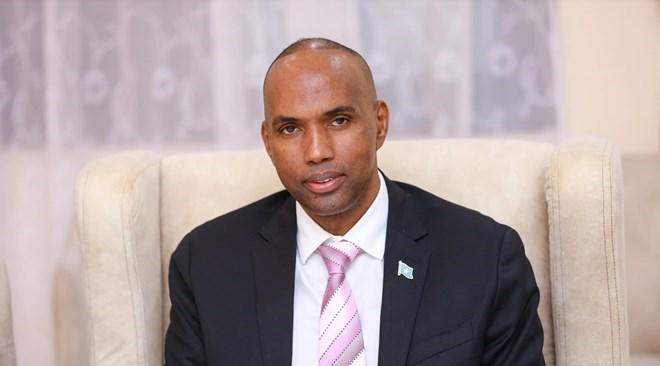
Thursday December 12, 2024

FILE - Former Somali Prime Minister Hassan Ali Khaire, pictured during an official meeting in Mogadishu. Khaire has recently voiced strong criticism of the Ankara Agreement, citing concerns over Somalia’s sovereignty.
Mogadishu (HOL) — Former Somali Prime Minister Hassan Ali Khaire has condemned the recent Ankara Agreement between Somalia and Ethiopia, labelling it a grave threat to Somalia's sovereignty. The deal, brokered by Turkish President Recep Tayyip Erdoğan, reaffirms Somalia's territorial integrity but fails, Khaire argues, to address Ethiopia's controversial maritime ambitions and its unilateral agreement with Somaliland.
The MoU, signed in January 2024, granted Ethiopia access to Somaliland's Berbera Port and a 20-kilometer stretch of coastline in exchange for recognizing Somaliland's independence. Widely condemned by Mogadishu, the MoU was described by Khaire as a "dormant volcano" threatening Somalia's stability.
"It is deeply regrettable that President Hassan Sheikh Mohamud has entered into negotiations with Ethiopia without first demanding the annulment of this illegal deal," Khaire said. "Engaging in talks with Ethiopia while it continues to uphold an agreement that threatens Somalia's unity is a betrayal of our sovereignty."
The Ankara Agreement, finalized on Wednesday, requires Ethiopia to negotiate maritime access directly with Somalia. While Mogadishu hailed the deal as a diplomatic win, Khaire and other critics argue that this omission undermines the agreement's intent to strengthen Somalia's sovereignty. Instead, they contend, it leaves room for Ethiopia to exploit ambiguities, jeopardizing Somalia's territorial integrity and federal cohesion.
As a landlocked nation, Ethiopia has long sought alternative trade routes to reduce its reliance on Djibouti, which handles over 95% of its maritime trade. The MoU with Somaliland offered a solution, but the Ankara Agreement effectively nullified unilateral arrangements and forced Ethiopia to work through Somalia's Federal Government.
Technical negotiations between Ethiopia and Somalia are set to begin in February 2025, with both sides facing significant political and logistical challenges.
"The Federal Government must prioritize resolving internal conflicts and strengthening Somalia's unity," Khaire said. "Political compromises that undermine sovereignty cannot be tolerated."